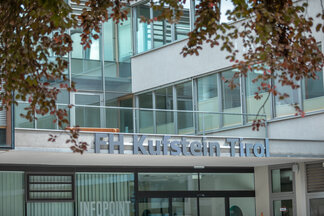Practical and part-time: Enhance your international business skills and let your personality shine as a leader. The perfect blend for your career!

International Business Management
Bachelor's degree program
Overview
-
Qualification Level:
Stufe 1, Bachelor -
Price:
Euro 363,36* (excl. Student Union-fees) each semester -
Academic Degree:
Bachelor of Arts in Business (BA) -
Academic Program:
Part-time -
Language:
65 % German, 35 % English -
Remote Options:
E-Learning max. 50 % online -
Exchange Semester:
Study trip and excursion in the 4th and 6th semester** -
Admission Requirements:
General admission requirements -
Study Places per Year:
25
Study program accredited by the Agency for Quality Assurance and Accreditation Austria

Program Description



Digital and international – this is the future of the working world. As things get reinvented, companies are actively seeking managers eager to shape these major transformations. There are plenty of challenges to tackle, from digitization and sustainability to artificial intelligence!
In the ever-evolving world of digitalization and sustainability, our bachelor’s degree program equips you to be a strategically-minded manager. We emphasize key skills such as analytical thinking, strategic planning, and effective communication. Our teaching approach enhances your communication skills, flexibility, and creativity – all crucial for success in tomorrow's interconnected job market. With a strong international focus, including study trips to leading companies, you'll gain valuable insights and build cultural competence. Our graduates are sought after across various business fields, including project management, marketing, HR, controlling, and finance, thanks to their comprehensive expertise. By studying on weekends (Friday and Saturday), you can continue advancing your career while preparing to become a future leader. Your path to strategic excellence starts here – flexible, practical, and centered on your personal growth.
Study Focus
-
39 %
Expert knowledge in economics and management
-
11 %
Expertise in digitalization & sustainability
-
13 %
International Skills (incl. trip abroad)
-
12 %
Social Skills & Languages
-
25 %
Practical knowledge transfer & Bachelor's thesis
What You Will Learn
-
Communication skills: Perfecting communication and teamwork
-
Digitalization & sustainability: basic knowledge for future challenges
-
Language skills: intercultural communication for international contexts
-
Strategic understanding: penetrating economic contexts
-
Methodological competence: structured solutions with quantitative methods
-
Practical experience: gaining professional expertise through projects
-
Practical knowledge transfer: effective application of concepts in the professional field
Popular Occupational Fields
- Marketing, product management, sales
- Controlling, finance and accounting
- Personnel and organizational development
- Project management and business development
- Consulting
- Management / Start-up
- Can be used in all industries, company sizes and types
Career Opportunities
-
16% of domestic SMEs
active in cross-border online sales
-
20,000 new jobs per year
in Austria through digitization
-
53% of exports
of Austrian GDP
-
> 160 Hidden Champions
in Austria
The path to the Bachelor's Degree

The part-time bachelor’s degree program fosters skill development through challenging tasks that blend practical experience with academic rigor, while emphasizing self-organization and proactive engagement. It prepares students to navigate VUCA challenges (volatility, uncertainty, complexity, ambiguity) effectively.
Special features:
-
1st year of study (VUCA-Basic): Clear guidelines, support in the first few semesters.
-
2nd year of study (VUCA-intermediate): More self-organization through practical projects, application orientation.
-
3rd year of study (VUCA-pro): More independence for maximum openness and flexibility.
Recognition of Prior Learning
Students with sufficient qualifications from Austrian commercial academies and higher occpuational profile schools with an economic focus (Germany and Austria) can receive credit for the following courses from the first semester:
- Introduction to Business Administration
- Introduction to Accounting and Finance
To apply for credit, they must submit a request directly to the Director of Studies.
Director of Studies

Prof. (FH) Dr. Peter Dietrich
Director of Studies Bachelor & Master International Business Management
Curriculum
• Introduction and history of the development of digitization
• Basic concepts and basic theories of digitization
• Overview of the factors influencing Markets & Companies through digitization
• First digital application and implementation methods in a business context
• Overview of the connections between digitization and classical business-related management functions (marketing, sales, HR, RandD, etc.)
• Development and change of markets, industries and business models through digitization
• Influence of digital trends on customers, competitors and market performance
• Effects of digitization on classical business concepts of: Companies, organization, management, culture, etc.
• Reflection and adaptation of classical business theories and models to digitization (life cycle, value chain, 5-forces, etc.)
The students are able to:
•build up financial knowledge related to current financial technologies.
• understand and interpret financial articles.
• understand and classify current trends in practice.
• strengthen their analytical skills.
• Basics of entrepreneurship
• Entrepreneurship in the individual phases of foundation and growth
• Entrepreneurship perspectives
• Business model and business model elements
• Application of analysis tools (e.g. Porters Five Forces, McKinsey-Portfolio, BCG-Matrix, Business Canvas)
• Presentation of the currently most important and most discussed trends in business
• Development of theories, models, methods and solutions for these current trends
• First application examples and best practices for these trends
• Mutual exchange and presentation of contents and solutions
• Ethics and morals in theory and practice
• Discussion of orthodox management approaches (among others: principal agent theory, shareholder value approach) from an ethical perspective
• Soft- vs. hard-law and its influence on the sustainability of management decisions
• Sustainable Development Goals (SDGs)
The language module integrated into the degree program curriculum is designed according to the methodological principles of a communicative, action-oriented approach.
The competence level of the module is based on the Common European Framework of Reference for Languages (CEFR), and a central objective is that students increase their communication skills by at least one level.
In addition, there is a clear focus on acquiring academic and business-oriented skills in the target language.
B2-C1+ Independent language use to expert, fluent communication skills
AThe language module integrated into the degree program curriculum is designed according to the methodological principles of a communicative, action-oriented approach.
The competence level of the module is based on the Common European Framework of Reference for Languages (CEFR), and a central objective is that students increase their communication skills by at least one level.
In addition, there is a clear focus on acquiring academic and business-oriented skills in the target language.
B2-C1+ Independent language use to expert, fluent communication skills
• Posting records, accounts, account assignment
• Structure of balance sheet and profit and loss account
• Posting of business cases
• Cost type, cost center and cost unit accounting
• Contribution margin and application
• Modern cost accounting systems
• Legal bases (step-by-step structure of the legal system)
• Private law
• Commercial law
• Sub-areas of commercial law (unfair competition, internet law, insolvency law, etc.)
• Economic growth, social inequality and ecological conditions
• Efficient allocation of scarce resources
• Market model and market equilibrium
• Strategic interaction and social dilemmas
• Elasticity and pricing
• Welfare analysis in case of state intervention
• Fundamentals and classification of ABWL
• Fundamentals of corporate management: Location decisions, inter-company con-nections, corporate constitution, organization, personnel management
• Basics of monitoring and cross-connections to Accounting & Finance
• Selected topics on service provision: Innovation management, carefully-selected marketing content
• Linear and quadratic functions
• Elementary financial mathematics
• Differential calculus
• Linear systems of equations
• Analysis of functions with two variables
• Optimization with Lagrange function
• Production theory, planning and organization of production
• Logistics in the company (procurement, storage, transport)
• Supply chain management internally and externally
• Classical and new approaches in HRM
• Trends and changes in the world of work (work processes, work methods, coopera-tion, leadership, etc.)
• Methods for the analysis and design of human resource management processes and of New Work
• Case studies and cases on HRM and New Work
• Basic concepts of statistics
• Univariate and multivariate data description
• Basics of probability theory and theoretical distributions
• Estimation procedures and statistical tests
• Software like MS Excel (in-depth) and/or SPSS/R (on an illustrative basis)
• Gini coefficient and Herfindahl index
• Interpretation of gross domestic product and consumer price index
• Measurement of economic growth and inflation
• Tasks of central banks in relation to money supply and interest rate setting
• Impact of monetary and fiscal policy
• Aggregated demand and aggregated supply
• Systemic crises related to the financial sector and environmental pollution
• Structure of balance sheet, P and L and cash flow statement
• Valuation principles for assets
• Risks in debt capital
• Balance sheet ratios
• Theoretical and practical fundamentals of the omnichannel ecosystem
• Interaction between omnichannel and corporate strategy
• Customer behavior, customer analysis and customer journey
• Omnichannel strategies in connection with a company's marketing mix
• Valuation methods for bonds and shares as well as financing and investment deci-sions of companies (including discounting methods, e.g. net present value, internal rate of return)
• Interest rates and the significance of interest rate developments on international financial markets
• Valuation of bonds and shares
• Theoretical basis of controlling
• Planning and control
• Information procurement
• Organization of controlling
• Digitalization in controlling
• Significance and basics of marketing
• Basic principles of market research
• Customer benefit, customer satisfaction, customer loyalty
• Marketing mix factors
• Product vs. service marketing
• Importance of brands in marketing
• Organizational theories
• Leadership, teamwork, conflicts
• Organizational climate and culture
• Attitudes, emotions and personality
• Change management models
• Methods and tools of change management
• Communication in the change management process
• Phases in the change management process
• Based on current literature on marketing and marketing-related areas, topics are selected and treated on a case-by-case basis.
• The choice of topics is made either by the students or by the respective course directors
• In some cases, experts and practitioners from the business world are used to pre-sent specific questions from their companies
• Globalization, international investment and migration
• Classic and modern trade theories
• Market failures, externalities and emissions trading
• Economic effects of climate change
• Taxation of foreign trade and CO2 emissions
• Introduction to strategic corporate management
• Core topics of strategic management: Navigation system, competitive strategy, mission statement, value creation
• Analysis and design of the strategy process in a company
• Essential strategy methods (value chain, 5-forces, etc.)
• Significance of market research and integration into the marketing process
• Customer and markets as objects of market research
• Planning and implementation of market research projects
• Creation and programming of questionnaires
• Basic qualitative and quantitative analysis methods
• Application of statistical software (SPSS, R, Stata) for data analysis
• Interpretation of results and derivation of recommendations for action
- Options and sources of secondary market research (e.g. Big Data)
• Introduction and basics in political science with an international focus
• Political history of ideas and reflection of current international tendencies
• Political systems and their influence on society and economy
• Discussion and classification of current political issues
• "Holistic strategic management" in the sense of combining strategy with: Organiza-tion, productivity, leadership, culture, change, etc.
• Linking strategy with current issues
• Development and adaptation of strategic methods
• Application and implementation of strategic issues for your own company
Current subject areas and questions are offered in order to give students the oppor-tunity to expand or supplement the regular IBS curriculum.
• Independent preparation and organization of an excursion to the surrounding for-eign countries in coordination with the course management
• Optional: Company visit, attendance of a conference or a workshop and direct ex-change with acting players and conceptual development of a relevant problem
• Characteristics, rules and basic principles of science and scientific work
• Scientific theory and methodological principles of scientific research
• Overview of the research method observation, questioning, content analysis and experiment
• Using word processing programs to write formally correct scientific papers
• Overview of databases and other ways to find literature sources
• Editing and critical discussion of articles from professional journals
• Basic principles of qualitative social research
• Survey methods in qualitative interviewing and observation
• Qualitative selection procedures and content analysis
• Group discussion and interviewing
• Combination of methods
• Current trends in practice and research in International Business Studies
• Development and careers of topics and methods
• Research in databases
• Finding one's way around when starting out in the professional world
• Supplementing theoretical knowledge with practical activities
• Processes, workflows and situations in the professional environment
• Confidence in implementing acquired knowledge
• Min. 100 working hours in full employment
• Advancing the knowledge of scientific work with regard to the development and implementation of a research design as well as the structuring of the editing pro-cess.
• Regular meetings to discuss the current status and progress of the Bachelor thesis with the accompanying academic supervision
• Information on the final Bachelor examination
• Topic development and preparation in the context of a poster and an exposé
• Presentation and discussion of a poster in small groups
• Poster and exposé creation
• Basics of thinking
• Reflecting, justifying and arguing
• Phases of problem solving
• Decision algorithms
• Types of learning for organizational learning
• Measures of organizational learning
• Elements of knowledge management
• Knowledge management (strategy perspective, HRM perspective, IT perspective)
• Project planning and organization
• Project cooperation and implementation
• Project performance
• Key figures of project management
• "Business idea development" practical project
• Structuring using Business Model Canvas
• Development of a business plan
• Impact of digitization on communication and information using proven concepts (stakeholders, etc.)
• Importance and change of project management in the digital age
• Elaboration of a practical project focusing on digitization using a specific company
• Toolbox for the implementation of digital topics
• Basics of modern portfolio theory
• Risk and return profiles of selected asset classes
• Properties of shares, bonds, indices, options and futures
The students:
• know the basics of management theory.
• understand the main principles, tasks and tools of effective leadership.
• are familiar with the topics of self-management, self-motivation and general lead-ership of their own person.
• are capable of diagnosing and developing leadership skills.
• Operational functions (production, marketing, logistics, supply chain management)
• Market analyzes and market developments
• Use of analysis tools (SWOT, benchmark, market shares, cost and contribution margin analyses, etc.)
• Development of strategies
• Controlling and key figures
• 5 axioms of communication, message and value square
• Theoretical introduction to presentation and argumentation techniques (analog and remote)
• Application of the discussed contents
• Feedback and reflection of one's own presentation achievements (individually and in the group) and the achievements of fellow students
• Basic information on communicative processes and effects
• Fundamentals of cooperation, negotiation, conflict resolution as well as group dynamics and team leadership
• Self-efficacy, self-control, resilience, self-management, work-life balance
• Independent preparation and organization of the trip in coordination with the man-agement of the course
• Visits to companies, courses at partner universities as well as lectures and events with the aim of gaining in-depth knowledge of the economic and socio-cultural spe-cifics of the country and its economy
• Concept of culture and cultural models
• Sensitization to international and multicultural working environments
- Building on culture-specific characteristics according to Hofstede, Trompenaars, Thomas, etc., the meaningful use of management tools adapted to cultural charac-teristics is developed in order to be able to work successfully in international teams and to contribute to the solution of intercultural conflicts
The language module integrated into the degree program curriculum is designed according to the methodological principles of a communicative, action-oriented approach.
The competence level of the module is based on the Common European Framework of Reference for Languages (CEFR), and a central objective is that students increase their communication skills by at least one level.
In addition, there is a clear focus on acquiring academic and business-oriented skills in the target language.
B2-C1+ Independent language use to expert, fluent communication skills
• Posting records, accounts, account assignment
• Structure of balance sheet and profit and loss account
• Posting of business cases
• Cost type, cost center and cost unit accounting
• Contribution margin and application
• Modern cost accounting systems
• Legal bases (step-by-step structure of the legal system)
• Private law
• Commercial law
• Sub-areas of commercial law (unfair competition, internet law, insolvency law, etc.)
• Economic growth, social inequality and ecological conditions
• Efficient allocation of scarce resources
• Market model and market equilibrium
• Strategic interaction and social dilemmas
• Elasticity and pricing
• Welfare analysis in case of state intervention
• Fundamentals and classification of ABWL
• Fundamentals of corporate management: Location decisions, inter-company con-nections, corporate constitution, organization, personnel management
• Basics of monitoring and cross-connections to Accounting & Finance
• Selected topics on service provision: Innovation management, carefully-selected marketing content
• Linear and quadratic functions
• Elementary financial mathematics
• Differential calculus
• Linear systems of equations
• Analysis of functions with two variables
• Optimization with Lagrange function
• 5 axioms of communication, message and value square
• Theoretical introduction to presentation and argumentation techniques (analog and remote)
• Application of the discussed contents
• Feedback and reflection of one's own presentation achievements (individually and in the group) and the achievements of fellow students
• Basic information on communicative processes and effects
• Fundamentals of cooperation, negotiation, conflict resolution as well as group dynamics and team leadership
• Self-efficacy, self-control, resilience, self-management, work-life balance
AThe language module integrated into the degree program curriculum is designed according to the methodological principles of a communicative, action-oriented approach.
The competence level of the module is based on the Common European Framework of Reference for Languages (CEFR), and a central objective is that students increase their communication skills by at least one level.
In addition, there is a clear focus on acquiring academic and business-oriented skills in the target language.
B2-C1+ Independent language use to expert, fluent communication skills
• Production theory, planning and organization of production
• Logistics in the company (procurement, storage, transport)
• Supply chain management internally and externally
• Classical and new approaches in HRM
• Trends and changes in the world of work (work processes, work methods, coopera-tion, leadership, etc.)
• Methods for the analysis and design of human resource management processes and of New Work
• Case studies and cases on HRM and New Work
• Basic concepts of statistics
• Univariate and multivariate data description
• Basics of probability theory and theoretical distributions
• Estimation procedures and statistical tests
• Software like MS Excel (in-depth) and/or SPSS/R (on an illustrative basis)
• Gini coefficient and Herfindahl index
• Interpretation of gross domestic product and consumer price index
• Measurement of economic growth and inflation
• Tasks of central banks in relation to money supply and interest rate setting
• Impact of monetary and fiscal policy
• Aggregated demand and aggregated supply
• Systemic crises related to the financial sector and environmental pollution
• Structure of balance sheet, P and L and cash flow statement
• Valuation principles for assets
• Risks in debt capital
• Balance sheet ratios
• Characteristics, rules and basic principles of science and scientific work
• Scientific theory and methodological principles of scientific research
• Overview of the research method observation, questioning, content analysis and experiment
• Using word processing programs to write formally correct scientific papers
• Overview of databases and other ways to find literature sources
• Editing and critical discussion of articles from professional journals
• Basics of thinking
• Reflecting, justifying and arguing
• Phases of problem solving
• Decision algorithms
• Introduction and history of the development of digitization
• Basic concepts and basic theories of digitization
• Overview of the factors influencing Markets & Companies through digitization
• First digital application and implementation methods in a business context
• Overview of the connections between digitization and classical business-related management functions (marketing, sales, HR, RandD, etc.)
• Theoretical and practical fundamentals of the omnichannel ecosystem
• Interaction between omnichannel and corporate strategy
• Customer behavior, customer analysis and customer journey
• Omnichannel strategies in connection with a company's marketing mix
• Valuation methods for bonds and shares as well as financing and investment deci-sions of companies (including discounting methods, e.g. net present value, internal rate of return)
• Interest rates and the significance of interest rate developments on international financial markets
• Valuation of bonds and shares
• Theoretical basis of controlling
• Planning and control
• Information procurement
• Organization of controlling
• Digitalization in controlling
• Significance and basics of marketing
• Basic principles of market research
• Customer benefit, customer satisfaction, customer loyalty
• Marketing mix factors
• Product vs. service marketing
• Importance of brands in marketing
• Organizational theories
• Leadership, teamwork, conflicts
• Organizational climate and culture
• Attitudes, emotions and personality
• Change management models
• Methods and tools of change management
• Communication in the change management process
• Phases in the change management process
• Based on current literature on marketing and marketing-related areas, topics are selected and treated on a case-by-case basis.
• The choice of topics is made either by the students or by the respective course directors
• In some cases, experts and practitioners from the business world are used to pre-sent specific questions from their companies
• Globalization, international investment and migration
• Classic and modern trade theories
• Market failures, externalities and emissions trading
• Economic effects of climate change
• Taxation of foreign trade and CO2 emissions
• Types of learning for organizational learning
• Measures of organizational learning
• Elements of knowledge management
• Knowledge management (strategy perspective, HRM perspective, IT perspective)
• Development and change of markets, industries and business models through digitization
• Influence of digital trends on customers, competitors and market performance
• Effects of digitization on classical business concepts of: Companies, organization, management, culture, etc.
• Reflection and adaptation of classical business theories and models to digitization (life cycle, value chain, 5-forces, etc.)
The students are able to:
•build up financial knowledge related to current financial technologies.
• understand and interpret financial articles.
• understand and classify current trends in practice.
• strengthen their analytical skills.
• Introduction to strategic corporate management
• Core topics of strategic management: Navigation system, competitive strategy, mission statement, value creation
• Analysis and design of the strategy process in a company
• Essential strategy methods (value chain, 5-forces, etc.)
• Significance of market research and integration into the marketing process
• Customer and markets as objects of market research
• Planning and implementation of market research projects
• Creation and programming of questionnaires
• Basic qualitative and quantitative analysis methods
• Application of statistical software (SPSS, R, Stata) for data analysis
• Interpretation of results and derivation of recommendations for action
- Options and sources of secondary market research (e.g. Big Data)
• Basic principles of qualitative social research
• Survey methods in qualitative interviewing and observation
• Qualitative selection procedures and content analysis
• Group discussion and interviewing
• Combination of methods
• Project planning and organization
• Project cooperation and implementation
• Project performance
• Key figures of project management
• "Business idea development" practical project
• Structuring using Business Model Canvas
• Development of a business plan
• Independent preparation and organization of the trip in coordination with the man-agement of the course
• Visits to companies, courses at partner universities as well as lectures and events with the aim of gaining in-depth knowledge of the economic and socio-cultural spe-cifics of the country and its economy
• Basics of entrepreneurship
• Entrepreneurship in the individual phases of foundation and growth
• Entrepreneurship perspectives
• Business model and business model elements
• Application of analysis tools (e.g. Porters Five Forces, McKinsey-Portfolio, BCG-Matrix, Business Canvas)
• Presentation of the currently most important and most discussed trends in business
• Development of theories, models, methods and solutions for these current trends
• First application examples and best practices for these trends
• Mutual exchange and presentation of contents and solutions
• Introduction and basics in political science with an international focus
• Political history of ideas and reflection of current international tendencies
• Political systems and their influence on society and economy
• Discussion and classification of current political issues
• "Holistic strategic management" in the sense of combining strategy with: Organiza-tion, productivity, leadership, culture, change, etc.
• Linking strategy with current issues
• Development and adaptation of strategic methods
• Application and implementation of strategic issues for your own company
• Current trends in practice and research in International Business Studies
• Development and careers of topics and methods
• Research in databases
• Impact of digitization on communication and information using proven concepts (stakeholders, etc.)
• Importance and change of project management in the digital age
• Elaboration of a practical project focusing on digitization using a specific company
• Toolbox for the implementation of digital topics
• Basics of modern portfolio theory
• Risk and return profiles of selected asset classes
• Properties of shares, bonds, indices, options and futures
• Concept of culture and cultural models
• Sensitization to international and multicultural working environments
- Building on culture-specific characteristics according to Hofstede, Trompenaars, Thomas, etc., the meaningful use of management tools adapted to cultural charac-teristics is developed in order to be able to work successfully in international teams and to contribute to the solution of intercultural conflicts
• Ethics and morals in theory and practice
• Discussion of orthodox management approaches (among others: principal agent theory, shareholder value approach) from an ethical perspective
• Soft- vs. hard-law and its influence on the sustainability of management decisions
• Sustainable Development Goals (SDGs)
Current subject areas and questions are offered in order to give students the oppor-tunity to expand or supplement the regular IBS curriculum.
• Independent preparation and organization of an excursion to the surrounding for-eign countries in coordination with the course management
• Optional: Company visit, attendance of a conference or a workshop and direct ex-change with acting players and conceptual development of a relevant problem
• Finding one's way around when starting out in the professional world
• Supplementing theoretical knowledge with practical activities
• Processes, workflows and situations in the professional environment
• Confidence in implementing acquired knowledge
• Min. 100 working hours in full employment
• Advancing the knowledge of scientific work with regard to the development and implementation of a research design as well as the structuring of the editing pro-cess.
• Regular meetings to discuss the current status and progress of the Bachelor thesis with the accompanying academic supervision
• Information on the final Bachelor examination
• Topic development and preparation in the context of a poster and an exposé
• Presentation and discussion of a poster in small groups
• Poster and exposé creation
The students:
• know the basics of management theory.
• understand the main principles, tasks and tools of effective leadership.
• are familiar with the topics of self-management, self-motivation and general lead-ership of their own person.
• are capable of diagnosing and developing leadership skills.
• Operational functions (production, marketing, logistics, supply chain management)
• Market analyzes and market developments
• Use of analysis tools (SWOT, benchmark, market shares, cost and contribution margin analyses, etc.)
• Development of strategies
• Controlling and key figures
Study regulations to download
-
International Business Management
in effect since October 22, 2025, start of study program from academic year 2026/27
- All study regulations
Frequently Asked Questions
Do I have to work while studying?
No, there is no obligation to work or to be active in the industry. The course offers you the opportunity for further development, even if you are working in another profession or are not currently working.
Unlike a dual study program, there is no binding contract with a company. Many students also use the course during parental leave or for professional reorientation.
Should you reduce your job to study?
As the course is offered on Friday afternoons and Saturdays, it is generally possible to work full-time. However, due to the amount of study required for the examinations, we recommend a reduction to approx. 80%.









